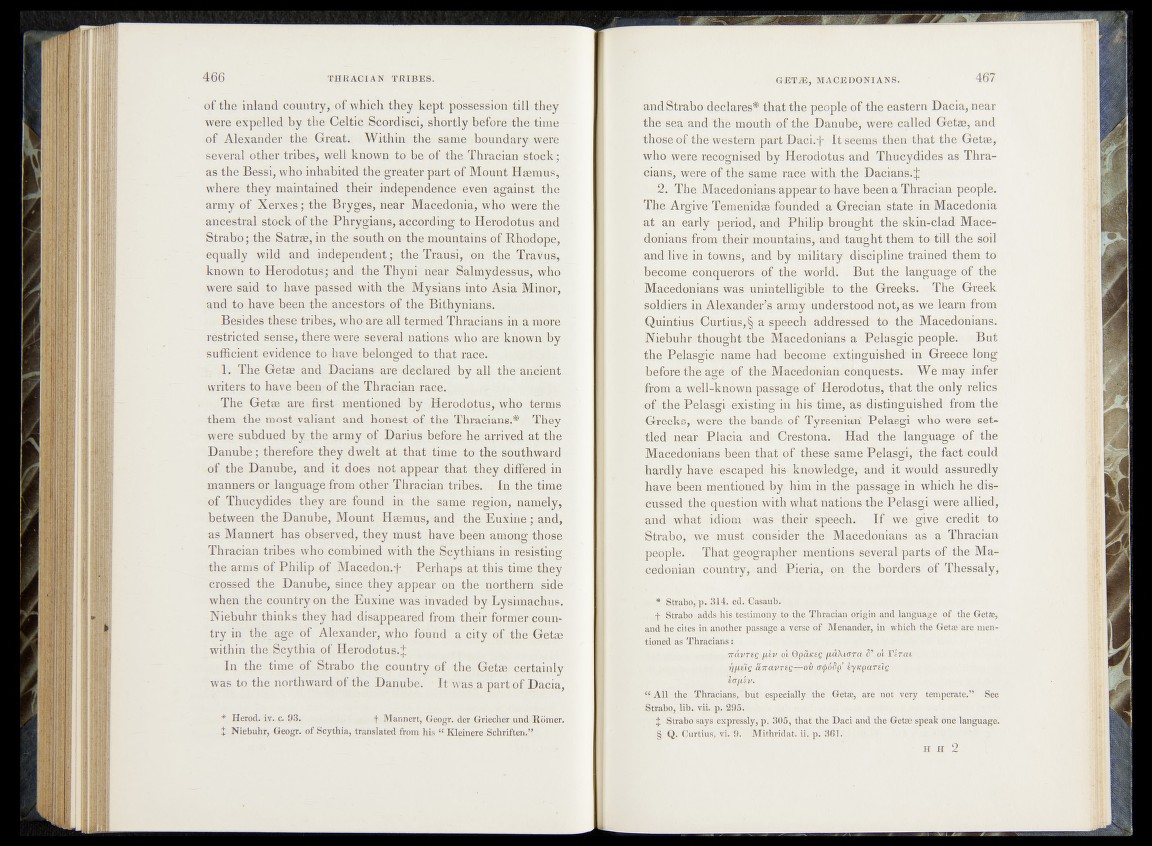
of the inland country, of which they kept possession till they
were expelled by the Celtic,-Scordisci,^shortly before the time
of Alexander the Great., Within the. same boundary- were
Several other tribes, well known to: be of the Thracian stock;
as the Bessi, who inhabited the greater .part of Mount Haemus,
whetejthey maintained their independence even against the
army of Xerxes; the Bryges, near Macedonia, who were -the
ancestral stock of the Phrygians, according to Herodotus and
S tra te ; the Satrae, in the south on the mountains of Rhodope,
equally wild and independent; the Trausi, on .the TfSvus,
known to Herodotus; and, the Thyni near Salmyjiessus, who
jn p ^ s a id 'to have passed with the MysiR'ns into Asia Minor,
and to haveibeen'the ancestors of the Bithyniaps.
Besides these tribes* who are all termed Thracians in a, more
restricted sense* there were several nations who are.khpwmby
sufficient evidence Jo have belonged to t h a t ^ C e ^
- 1 . The Getae and Dacians are declared by all thpltarient
writers to have been of the Thracian;race.
The Getae am- first- mentioned by Herodotus,-, who terms
them the most valiant and honest of the Thraqians.*, ,The*y
were subdued by the army of Darius before heiarriwejl- at .jthe
Danube; therefore they dwelt at th a t; tipq .fertile southward
of the Danube, and it does not appear that th ey coffered ju
manners or-language from otherThracian tribes.^ In the time
of Thucydides they are found -in feKe^ same region, namely,
between the Danube, Mount Hsemus, and the Euxine; <und,
as Mannert has observed, they must have bebh ^mong those
Thracian tribes who combined with the Scythians in, resisting
jth e arms of Philip of Macedpifet Perhaps at this time they
crossed the Danube,, since they appear on the nprtbfm^side
when the country on the Euxine was invaded by Lysimachus.
Niebuhr thinks they had disappeared from their former country
in t h e age of Alexander, who found a-city of the Getae
within the Scythia of Herodotus.^
In the time of Strabo the country of the Getae certainly
was to the northward of the Danube. It was a part of Dacia,
* Herod, iv. e. 93. f Mannert, Geogr. der Griecher und Romer.
- X Niebuhr, Geogr. of Seydjia, translated from hi» “ Kleinere Schriften,”
and Strabo declares* that the people of the eastern Dacia, near
the sea and Hie mouth of the Danube, were called Getae, and
those of the western part Daci.-f- It seems then that the Getae,
who were ,recognised by Herodotus and Thucydides as Thracians,
.were of thfe same race with the Dacians.J
2. The Macedonians appear-to-have been a Thracian people.
The Argivte'Tentenïdae' founded■«? Grecian state in Macedonia
at an early period, and Philip brought the skin-clad Macedonians
from theirl mountains, f&hfdHawght them to till the soil
and 1 in towns, and by military discipline trained them to
become conquerors« , of the eWorld, But the language of the
Macedonians was unintelligible^’to -the Greeks. The Greek
jpoldieps, in Alexander's army «understood not, as we learn from
Quiniius3 Gurtius,§ a speech addressed to the Macedonians.
^Niebuhr thought the Macedonians a Pel'aègic people. But
the Pelasgic - name had become "extinguished" in. Greeèe long
r:befoiseilhfe.age^bf the Macedonian conquests. We may infer
from a-.w^l-kno-wh passage :of- Herodotus, that the only relics
of|the Pelasgi in his time, as distinguished from the
-Greeks,' were the bands.of Tyrseniarf Pelasgi who were settled
near Planar a;ndi Grestona. Had the language*, of the
Macedonians been that of these same Pelasgi,’Jhe fact could
hardly have fesGapedihis- knowledge, and it would aspuredly
have{been- mentipÉediiby hiksuin the passage in which he discussed
thefqjöestionrtwith what nations th® Pelasgi were allied,
and what idiom was ■ thehv Sjlbeeh.- If we1 give credit to
-Strabo, we must consider the Maeedonians as tfa;» Thracian
,;peoptei‘ . That1 geographer mentions|sêvëral parts of dhe Macedonian
ebuntry, and Pieria, on ithh ib orders of Thessaly,
* Strabo, p. 314. ed. Casaub.
, + Strabo adds his testimony to the Thracian origin and language of the Getae,
and he dies.in another passage a verse of Menander, in,-which the Getae are raen-
tioned as Thracians:
i>( -pi; 9 pa k £ £ paXnrra Téra-is1,
rj/xuQ a ira vT $ i0 ty il\a $ i!)$ 0 ’ Èy(cpflcrsÏ£s»1
eqüLv.
All th e . Thracians, oüt especially the Getae, are not very temperate.” See
Strabq^lib. viii p. .295. i ■
'-/■f Strabo says expressly, p. 305, that the Dad and the Getae speak one language.
! § Q. CuitTus, Vi. 9. Mithridnt; iiirp. 361.
II H 2